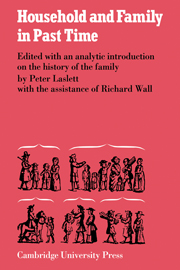Book contents
- Frontmatter
- Contents
- List of contributors
- Preface to the first impression
- Preface to the second impression
- 1 Introduction: The history of the family
- 2 Some demographic determinants of average household size: An analytic approach
- 3 The evolution of the family
- ENGLAND
- WESTERN EUROPE
- SERBIA
- JAPAN
- NORTH AMERICA
- 20 The average size of families and households in the Province of Massachusetts in 1764 and in the United States in 1790: an overview
- 21 Demography and psychology in the historical study of family-life: a personal report
- 22 Rhode Island family structure: 1875 and 1960
- Bibliography
- Index
22 - Rhode Island family structure: 1875 and 1960
Published online by Cambridge University Press: 02 November 2009
- Frontmatter
- Contents
- List of contributors
- Preface to the first impression
- Preface to the second impression
- 1 Introduction: The history of the family
- 2 Some demographic determinants of average household size: An analytic approach
- 3 The evolution of the family
- ENGLAND
- WESTERN EUROPE
- SERBIA
- JAPAN
- NORTH AMERICA
- 20 The average size of families and households in the Province of Massachusetts in 1764 and in the United States in 1790: an overview
- 21 Demography and psychology in the historical study of family-life: a personal report
- 22 Rhode Island family structure: 1875 and 1960
- Bibliography
- Index
Summary
INTRODUCTION
A neglected area of family sociology is that of historical research concerning the development of the American family. In his recent commentaries on the family, one of Goode's principal themes has been the lack of historical research by sociologists that would provide sound empirical tests of the common theories of change in family organization. He writes:
The study of family change is especially plagued by the prevalence of myths about the past. Most discussions of the U.S. family contain such a myth, which typically depicts a harmonious life down on grandmother's self-sufficient farm. Whether this myth corresponds to reality, we do not know, since very little historical research has attempted to test it. Not a single history of the U.S. family would meet modern standards of historical research.
This chapter is a partial report of an effort to reconstruct the demographic history and to measure specific structural and compositional changes in organization between 1875 and 1960 within the Rhode Island family. Simply, how has the family changed? More explicitly, what observable demographic changes in the Rhode Island family can be found for 1875 in comparison with the present?
DATA USED
Family and household data were collected from the original, handwritten, 1875 Rhode Island State Census listings. Using a five percent sample of families from this 1875 Census, family and household characteristics were reconstructed as closely as possible in conformity to the 1960 United States Census family and household definitions.
- Type
- Chapter
- Information
- Household and Family in Past Times , pp. 571 - 589Publisher: Cambridge University PressPrint publication year: 1972
- 8
- Cited by



